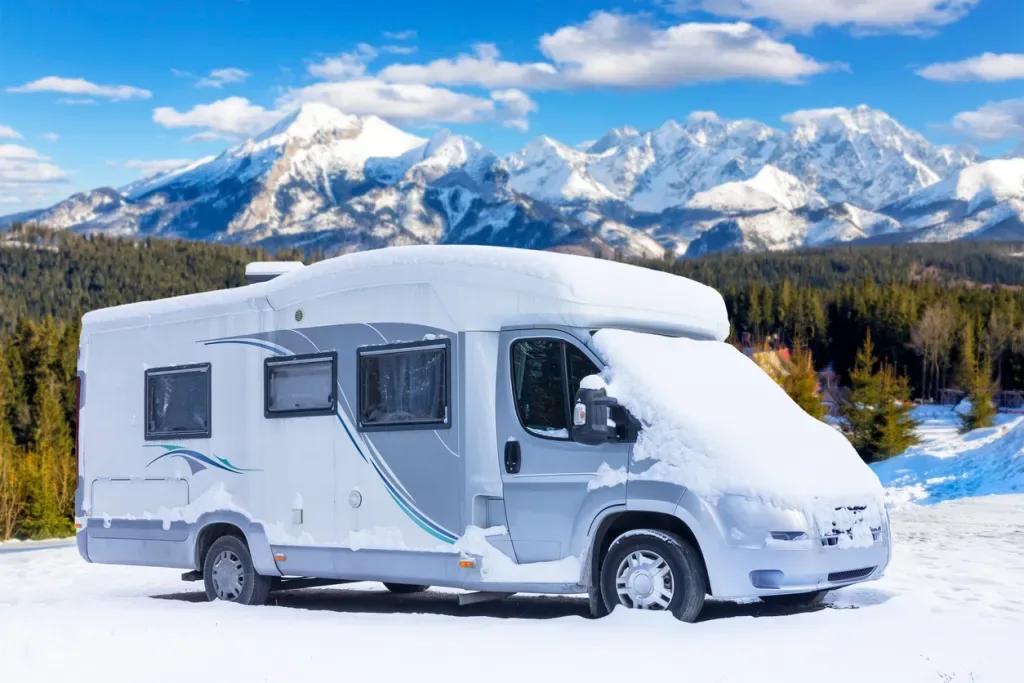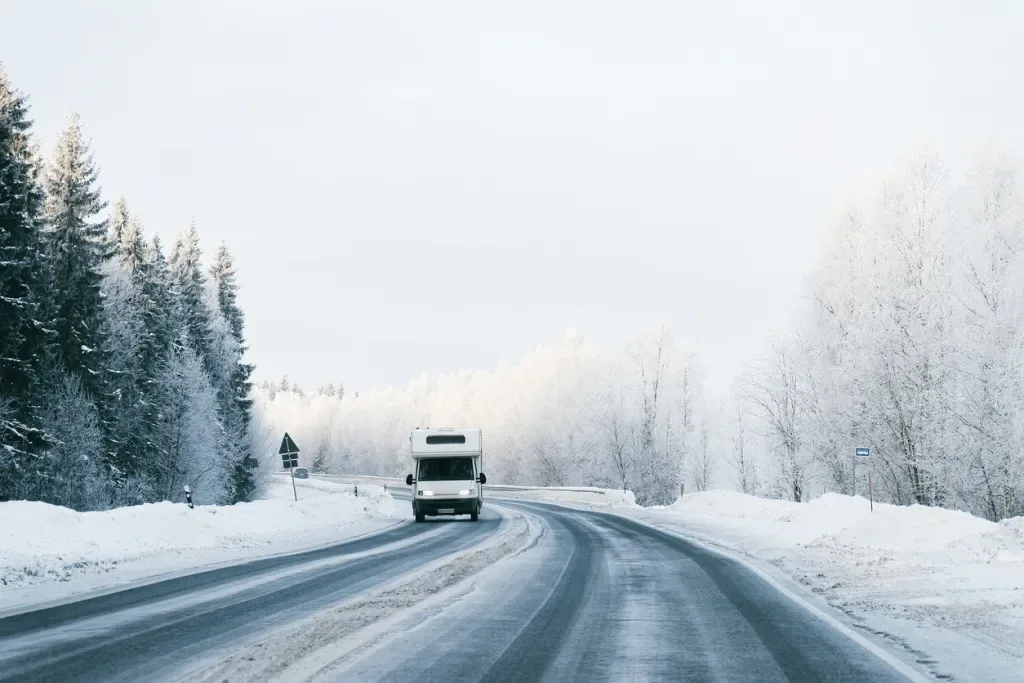Taking your RV out in the snow might seem like a crazy idea. Regular travelers are notorious for chasing the sun, and freezing weather isn’t usually on the menu.
Inclement conditions can put a lot of stress on drivers. And while your camper may be able to withstand the elements, that doesn’t mean heading out into winter weather is the best call.
However, we’ve got some tips on how to tackle the worst of it so you can enjoy the great outdoors any time of year.
Let’s get rolling!

Why Camp in Your RV in the Snow?
Getting out into nature during winter offers perks that fair-weather RVers never see. Usually, campgrounds and national parks see a drop in visitors through the cold. That means you’ll have access to the best spots without the crowds and traffic.
Another drawback of summertime camping is the bugs. After all, nothing ruins an al fresco meal quite like a swarm of mosquitos. Add to that oppressive heat and humidity, and chilly temperatures don’t sound so bad.
Campgrounds see a significant decrease in reservations while Old Man Winter is around. Consequently, prices are usually better for visitors during this time of year.
The benefits of spending the holidays at your favorite camping spot, away from the hustle and bustle, can’t be overstated. Annoying relatives aren’t likely to come out and bother you on Christmas morning at the KOA.
But the opposite is also true. A perfect holiday spent with family by the river might be what you need. And nothing beats enjoying breakfast in your RV with views of snowy fields and mountain peaks.
What Are the Dangers of RVing in the Snow?
RVing in the snow is different than just winter camping. Sure, the temperatures may drop without precipitation, but adding a layer of ice to the roads is scary.
When the white stuff falls, you’ll want to be more cautious about reaching your destinations. Avoiding the worst is your best option in the face of hazards like slippery turns and steep grades. For this reason, you’ll want to check forecasts leading up to your trip. If there’s foul weather coming, you may want to leave early or postpone your trip.
Additionally, you’ll need to take it slow when driving. Especially if you’re towing your rig, plan for extra time in transit to get to your campsite safely.
Even four-season RVs aren’t designed for extreme temperatures. Camping below freezing is one thing, anything far below zero and you’re risking damage to your vehicle. Most have pipes underneath that may not be insulated against the cold. When heavy snow enters the equation, you’re looking for trouble.
Can Your RV Handle Camping in the Snow?
With all the drawbacks and dangers, you’d think going out in the winter is just too dangerous. The truth, however, isn’t quite so simple. With the proper preparation and gear, your RV can handle almost anything nature can dish out.
The most crucial step is purchasing a skirt for the underside of your vehicle. Heated water tanks are wonderful, but a seal around the edges goes a step further to protect your pipes. Remember that heat rises, so your floor will stay warmer too.
Some companies like Camco produce heated water hoses too. These are great for connecting your rig to outside spigots because you’re not risking a burst connection.
Blackwater hoses are best left unconnected unless you’re draining the tank. If you’re parking in the same spot for a while during winter, keep the hose off the ground. Once your tank is empty, ensure the hose is clear before storage. Cleaning out frozen poo isn’t a fun task.
Finally, add insulation and dual-pane windows to your spring maintenance checklist. Keeping yourself warm is easier when the walls keep heat inside. Double-layered glass provides an extra barrier between the elements and indoor space. These upgrades will keep you nice and toasty during a freeze.
Essential Items for RV Camping in the Snow
You don’t have to avoid heading out in the snow with your RV. Before the winter winds start howling, make your plan of attack against the elements. Our list of essential items will get you started down the right road.
Extra Insulation
Adding insulation to your rig is one of the best ways to increase efficiency. The benefits extend beyond just winter camping too. You’ll notice a significant difference in your energy use throughout the year.
Low-hanging fruit, like weather stripping around your doors and windows, are easy to reinforce. Additionally, products like Reflectix or other radiant barriers keep heat inside. Simple things like rugs will keep your feet warm on the coldest days.
Ceiling vents are one of the fastest ways to lose heat during winter. Vent pillows are a great solution because they’re easy to install and remove.
Heated Water Hose
Heated hoses are essential for cold-weather camping. They provide a safe way to ensure you have access to all the water you need while you’re on the road.
Staying connected is okay if you’ll be in the same spot for a while. However, if you’re not spending much time at a given stop, top off your tanks and drain the hose for safety.
Price Check: Camco 25-Foot Heated Drinking Water Hose.
Extra Propane
Considering that your rig’s furnace runs on propane, have extra on hand during the winter. You’ll end up using more than you expect. And when a storm strikes, you won’t want to be without it.
Another great option is to include space heaters in your arsenal. There are some excellent electric options and even a few indoor propane-fueled ones. For natural gas, make sure to vent your space properly. Dangerous carbon monoxide buildup is a risk with these devices.
Blankets and Cold Weather Gear
After a day of enjoying the perks of RVing in the snow, nothing beats curling up on your sofa with a cozy blanket. Pack extra for cold weather camping so that everyone can stay warm. Wool socks are a nice addition, too, since they’ll keep your feet toasty.
Other items include sweaters, hoodies, jackets, and puffer coats for outdoor excursions. You can enjoy hiking, skiing, and other winter sports with the right cold-weather gear.
We wondered: Should You Use a Heated Blanket in Your RV Overnight?

Driving Your RV in the Snow
It’s hard enough to handle safe driving in your car when there’s ice on the road. It can spike your blood pressure, especially if it’s not your usual environment. That said, many of the tips for regular vehicles translate to RV driving in the snow.
The first thing you’ll want to do is slow down. It’ll take longer to accelerate and, more importantly, stop. Give yourself extra room, and don’t slam on your brakes. Instead, ease off the gas early and slowly apply the brakes to keep your rig under control.
Turning is another major hazard that gets worse in your camper. Decrease your speed and gently turn the steering wheel when approaching a turn. Even small movements multiply in bad weather, so keep it under control.
At the end of the day, no trip or experience is worth the health and safety of your family. Conditions can get worse quickly and without warning. If you’re unsure what you’re driving into, it’s okay to cancel a trip.
Some rigs are better suited to these conditions. Many camper vans and Class B rigs are designed for more off-road pursuits. But even four-wheel drive won’t do you much good on the ice, so don’t get a false sense of security. Caution is your best defense.
Deep Dive: NIGHTMARE: Driving Your RV in the Snow.
Is RV Camping in the Snow Worth It?
With the right preparation and planning, RVing in the snow is a blast! You’ll have access to campgrounds that are normally packed, and the views alone are worth it.
Even if you’re visiting familiar places, a frosty coating changes everything. Pack extra blankets and some hot chocolate, and you’ll likely fall in love with the new snow camping experience.
Discover the Best Free Camping Across the USA
To be honest with you, we hate paying for camping. There are so many free campsites in America (with complete privacy).
You should give it a try!
As a matter of fact, these free campsites are yours. Every time you pay federal taxes, you’re contributing to these lands.
Become a FREE CAMPING INSIDER and join the 100,000 campers who love to score the best site!
We’ll send you the 50 Best Free Campsites in the USA (one per state). Access the list by submitting your email below: